Irrespective of your ethnic group or nationality, it is highly likely you’ve come across Adrinkra symbols either knowingly or not.
Be it printed on clothes, fabricated into jewellery, carved into intricate accessories or tattooed on the skin, just to mention a few, the symbols have gone global thanks to their varying and intriguing meanings and interpretations.
Created by the Akans of Ghana, the Adinkra symbols, which flaunt the unique history and culture of the ethnic group, were first recorded around the 19th century.
According to Learn Akan, the symbols “represent certain human concepts, values, and ideas which have been creatively expressed through art” and “convey wisdom through the messages they carry.”
With several symbols with educative meanings out there, we round up 16 of the popular ones by their local names and interpretations. Take a look at them below. All interpretations are sourced from Learn Akan.
1
Adinkrahene 
‘Chief of all Adinkra symbols’
This symbol is said to have inspired the creation of all the Adinkra symbols.
Symbolizes: Leadership, greatness, charisma
2
Akobɛn 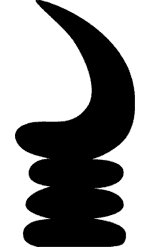
‘War horn’
Named after the horn blown by Ashantis to alert people of a battle
Symbolizes: Vigilance, wariness
3
 Akoma ntoasoɔ
Akoma ntoasoɔ
‘Linked hearts’
Symbolizes: Understanding, agreement
4
 Mɛware wo
Mɛware wo
‘I’ll marry you’
Symbolizes: Commitment, promise
5
 Boa me na memmoa wo
Boa me na memmoa wo
‘Help me and let me help you’
Symbolizes: interdependence, cooperation
6
 Nea ɔpɛ sɛ ɔbɛdi hene
Nea ɔpɛ sɛ ɔbɛdi hene
‘He who wants to be king’
Taken from the saying “Nea ɔpɛ sɛ ɔbɛdi hene no sua ɔsom ansa” which means “He who wants to be king must first learn to serve”
Symbolizes: Service, humility, leadership
7
 Nyamedua
Nyamedua
‘God’s tree/altar’
Symbolizes: God’s presence and protection
8
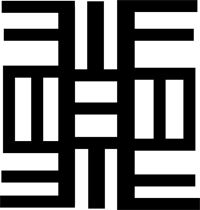 Nea ɔnnim no sua a, ɔhu
Nea ɔnnim no sua a, ɔhu
‘He who knows not, can know from learning’
Symbolizes: Education, quest for knowledge
9
 Ananse ntentan
Ananse ntentan
‘Spider’s web’
Named after the web of the spider, who is well known in Ghanaian folktales as possessing many different traits.
Symbolizes: Wisdom, creativity, complexities of life
10
 Onyankopɔn adom nti biribiara bɛyɛ yie
Onyankopɔn adom nti biribiara bɛyɛ yie
‘By the grace of God, all will be well’
Symbolizes: Hope, faith, providence
11
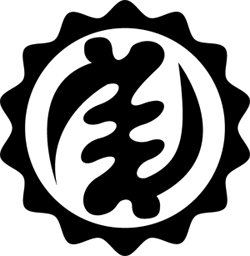 Nyame yɛ ɔhene
Nyame yɛ ɔhene
‘God is king’
Symbolizes: God’s supremacy, majesty
12
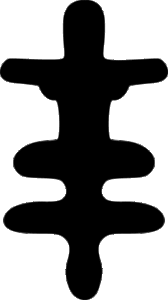 Ɔkɔdeɛ mmɔwerɛ
Ɔkɔdeɛ mmɔwerɛ
‘The talons of the eagle’
The strength of the eagle, which is known as the mightiest bird in the sky, is concentrated in its talons.
Symbolizes: Strength, power, bravery
13
 Dua afe
Dua afe
‘wooden comb’
A valued possession of the ancient Akan woman used to comb and plait her hair.
Symbolizes: Feminine beauty, cleanliness
14
 Ɛse ne tɛkyerɛma
Ɛse ne tɛkyerɛma
‘The teeth and the tongue’
The idea that the teeth and the tongue depend on each other in role playing inside the mouth. A conflict may develop between them, but they resolve it themselves and move on. Taken from the saying “Ɛse ne tɛkyerɛma nya asɛm a, wɔn a na ɔsiesie”.
Symbolizes: Friendship, interdependence
15
 Gye Nyame
Gye Nyame
‘Except God’
This symbol is perhaps, the most used Adinkra symbol in Ghana. This reflects the highly religious nature of Ghanaians.
Symbolises: Supremacy of God
16

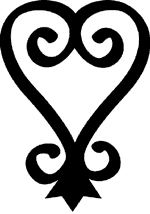 Sankɔfa
Sankɔfa
‘Return and take it/Return to your roots’
Symbolizes: History, the importance of learning from one’s past










